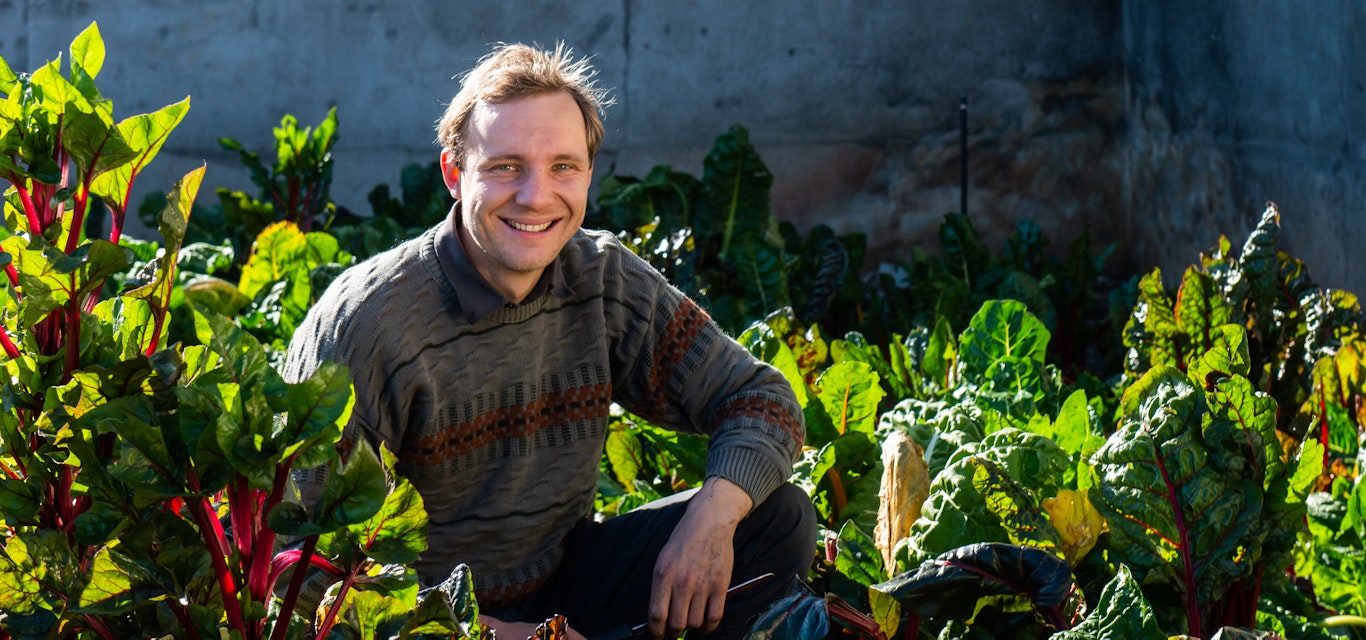A mile in the shoes of a head gardener
Ben Groundwater chats to Mitch Thiessen on how he went from cooking to growing.
Mitch Thiessen’s family have always been farmers. His great-grandfather worked the land outside Geeveston, growing apples, keeping cattle; he passed the profession on to Mitch’s grandfather; and then he, in turn, kept the fires burning in Mitch’s father. Farming is in the Thiessen blood. It’s embedded deep in the DNA. And yet.
“I was always told that I should never be a farmer,” Mitch laughs now. “Those were the wise words of my grandfather. But I guess after a while you end up becoming the thing they tell you not to.”
Farming is tough. It’s hard work. Mitch, however, is not a farmer in the traditional mould, not one his great-grandfather would probably recognise. After training as a chef and doing stints cooking in NSW and in Japan, a young Mitch had an epiphany: he could take care of his ethical concerns around food consumption, around environment and around community not by cooking, but by growing.
It led him all the way to being head gardener for the iconic Agrarian Kitchen restaurant and cooking school in New Norfolk.
“Probably the vast majority of people getting into farming now are coming from a cooking background,” Mitch, 32, says. “Primarily it’s because they love food. I mean, a lot of farmers enjoy food, like my family, but they don’t know how to prepare things in a certain way. When you have that knowledge [as a chef], food takes on a greater meaning. And when you follow that to the source, it all starts in the soil, and you get really excited about growing.”
Mitch now has one of the most enviable jobs in the farming world. When, three years ago, Agrarian Kitchen owners Rodney Dunn and Séverine Demanet decided to consolidate their operation and create a whole new market garden on the Willow Court site in New Norfolk, they hired Mitch to do it. He was able to start from scratch, and is now midway through the project, still growing vegetables to supply the Agrarian Kitchen restaurant, while also preparing for the reopening of the cooking school, which will include tours of the garden and tips on sustainable growing.
It's such a dream job," Mitch enthuses. "There are interesting gardening jobs out there, but not like this."
“It’s such a dream job,” Mitch enthuses. “There are interesting gardening jobs out there, but not like this, where the garden is connected to a restaurant, connected to a cooking school, in the middle of a township. It’s such an amazing opportunity to get to be there at the start, too.”
A typical day for Mitch and his two assistant gardeners begins at about 8am. The three walk the grounds of the garden, looking for potential problems, checking infrastructure, examining plants, seeing what’s ready to pick. They then consult with Agrarian Kitchen head chef Stephen Peak. Here, the garden leads the kitchen, rather than the other way around. And then, they prepare for the real work.
“We usually harvest in the mornings, because veg keeps longer if it’s cooler when you’re harvesting,” Mitch says. “We’ll harvest the veg and clean it, and we’ll often go into the kitchen and speak to the chef about what else is happening, what else is coming up."
“And at the moment for us we’re prepping new garden beds, getting ready for spring. So we’re doing a fair bit of propagation, planting seeds, making soil blocks. Once we get that out of the way it’s usually infrastructure, moving sheds, building shade houses. So, it’s super varied.”
There’s usually a break for morning tea, when the cooks bring out coffee and snacks. They stop for lunch, which is always a highlight. Afternoon tea, too. And then there are other things to take care of, including the garden’s complex composting system. Nothing is wasted at the Agrarian Kitchen, nothing organic goes into landfill, which is an enviable outcome, but a difficult one to achieve.
“We try to showcase a form of gardening and growing that’s relatively low input,” Mitch says. “All the waste we collect, we turn into different amendments or fertilisers for the garden. All the food waste, we compost in a fairly elaborate system, a fairly creative system where it’s inoculated with all these special microbes.
“But other things that are harder to compost, like shells and bones, we turn those into other amendments. For instance, with the shells, the chefs roast them for us, then we crush them up, soak them in an acid solution to break apart all the calcium and phosphorus, and then we can spray that over our crops instead of going to the local ag shop and buying calcium spray.”
This is farming – but not as Mitch’s relatives might know it.
